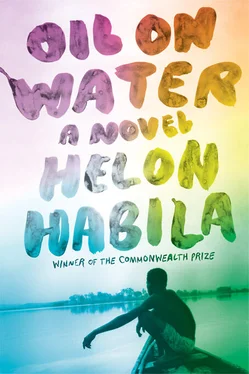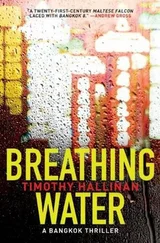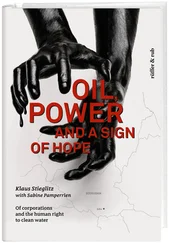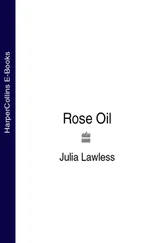— Ah, anyway. He left. He also moved out of our flat while I was at work, with no forwarding address. Just like that. I asked around among our friends, but no one knew where he had got to. I didn’t see him again till a year later, and you know where he was all that while? At Bar Beach. If you knew Bar Beach in the eighties, which you didn’t, ha ha. You certainly didn’t. Ever heard of the Bar Beach Show? That was in the seventies. The Bar Beach Show. Armed robbers tied to sand-filled tin drums and shot by soldiers right in front of cheering crowds. That was the Bar Beach Show under the military government. In the eighties, it was beer shacks and prostitutes. We had democracy, the dark days of the late sixties and seventies were over, the country was desperate to put the civil war behind it. The victims were just glad the nightmare was over, and the victors — well, what victors? Makeshift barrooms and restaurants were lined up along the beach, and young girls from all over the country went to Lagos looking for opportunity, most of them from respectable backgrounds, but Lagos doesn’t care how respectable you were in your village. Hey, this was Lagos. They ended up as prostitutes on Bar Beach. Some ended up pregnant and homeless on the streets, and they were the lucky ones. The unlucky ones died, their bodies discovered in the water days later, washed up in faraway Lekki. Raped. Brutalized. Strangled. Stabbed. Well, Zaq saw the story in that when the rest of us saw only prostitutes selling sex. Every day he’d be there with those prostitutes, talking to them, and who knows, perhaps sleeping with them, maybe pimping for them. Ha ha. No, just kidding. Come on, young man, lighten up. Some of the girls were really pretty. Regular-looking girls, only they weren’t regular, they were prostitutes. I’d go there when there was no news to chase and I’d sit with him in the shacks and drink beer, and some of the girls would come over and sit with us.
— One of them would later become famous for her involvement with him. I could tell that day, when I first saw her, I could tell there was something special between them. She was younger than the others, about eighteen. And, thinking about it, he wasn’t all that much older than her. We were very young then, young and stupid and full of dreams. In Lagos you can dream, you see. There are no boundaries, no traditions or family to hold you back. It is that kind of place. Anyway, this girl, Anita, she sat right next to him and didn’t leave us even when the others drifted off to hustle men. And when she heard I was a journalist she said to me, Zaq is writing a story about us. Did you know that? She didn’t speak much, but when she did she spoke well. She was pretty, perhaps the prettiest thing I’ve ever seen, and believe me, as a journalist I’ve seen a lot of pretty things. It’s hard to think that way about a prostitute, right? And she had manners, good breeding. I could tell. She had her hands on the table, and they weren’t garishly painted like the other girls’. Her nails were cut short, clean, her makeup was moderate, adequate. She was like a college girl. She seemed lost in that place, out of her element. Yes, I said to her. Zaq told me. Is Anita your real name? She looked at Zaq quickly before she answered, Yes. Why do you want to know? Zaq looked at her and said, Are you sure you don’t want to be going now, Anita? You can’t stay here talking to us all night. He laid a hand on her shoulder as he spoke. I had never seen Zaq like that before, so gentle, so soft and mellow.
— The fool was in love. I watched Anita wrinkle her pretty nose and shake her head. No. I enjoy being with you. And she stayed with us till we left. I told Zaq, Be careful. I think she likes you. But of course I meant he should be careful not to like her too much. He laughed, confident, arrogant as usual. They’re just subjects for me. That’s all. I’m going to write the most in-depth, interesting feature on prostitutes in Lagos. But who wants to read about prostitutes in Lagos? I asked. That was when he told me Anita’s story. He said Anita had been thrown out of her parents’ house when she became pregnant at sixteen. Her boyfriend couldn’t marry her because he was too young and still in school. Zaq said that in the traditional system her boyfriend would have had no option but to marry her. But now her Christian parents threw her out because she had brought shame upon them. He said that by writing about the girls he would be showing what was happening to all of us, how we were gradually changing as a people. Our values, our culture, our way of life. All changing irrevocably. Think about it.
— That shows you how ahead of his time he was. Well, he wrote his story. And he got his job back, plus a promotion. You’ve read the piece, I’m sure, perhaps studied it in that school of journalism you went to. “Five Women,” he titled the story. Not “Five Prostitutes,” “Five Women,” you get that? Every weekend he told the story of one of the five. They were all below twenty. And you know what he said? People cried as they read the intimate stories of these girls. The politicians were compelled to act. Governors’ wives started a scholarship scheme to send the girls back to school, they called it “A Better Life for Fallen Women.” Speeches were given on TV, international organizations invited Zaq to talk about his experience of living with the prostitutes in order to write about them. All over the country, charities working with the police raided brothels to save innocent girls from their terrible life, but hey, not all of them wanted to be saved or rehabilitated, they just wanted to be prostitutes! Ha ha.
— Well, our weekend paper became the biggest-selling in the country. Zaq’s byline became a magic formula. People read whatever he wrote, and he did write great stuff. Crusading kind of stuff, but always from the inside, intimate. But you know what, he told me that with all that success he missed his days at Bar Beach. He missed Anita. She went back to school and actually graduated. And I think it was to forget her that Zaq threw himself into the pro-democracy movement when the military dictators returned in the late eighties. He wrote fiery, fearless anti-military pieces that even our editor was hesitant to publish. Zaq left us and was immediately wooed by all the prominent papers. In the end he became editor of Action! magazine in Ikeja. He did some of his best work then. This was the late eighties, remember, most of us had to maintain two or three addresses just to stay a step ahead of the military goons. But you’ve heard all this before at that school you went to, haven’t you? You have. Well, just humor me, unless you have a wife to go back home to — let me conclude my story, there may be a lesson in this for you. And what is that lesson? Don’t fall in love with a prostitute, my friend—
— I really have to. . it’s getting late—
— Just listen, I’m almost finished.
I listened, even though I knew the rest of the story. A major part of Zaq’s life, because of the sheer brilliance of it, had been lived in full public view. At a certain point he stopped being the man behind the news and became the news. He reached the height of his fame during the worst years of the dictatorship — the Abacha years, from 1993 to 1998.
— After the dictatorship most people, including myself, expected him to join the new government, but he kept his distance. He went back to his former paper, Action! , and continued his in-depth, weekend-style features. But not with the same conviction. By then he had started drinking heavily. His editorials became increasingly critical of the new government that he and his pro-democracy pals had worked so hard to bring to power, but then in 2003 he joined the government. He became an adviser to the information minister, a tough guy with many enemies in the cabinet.
Читать дальше












